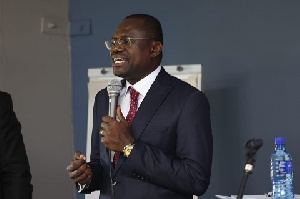It seems that in Ghana, the justice system more often than not, descends heavily on goat, cassava and plantain thieves, and let go the impenitent criminals who hide behind narrow political lines.
In fact, I was over the moon when the Supreme Court of Ghana gave a favourable verdict in the case of Occupy Ghana versus the Auditor General that the latter is obliged to retrieve the embezzled or stolen funds from the culprits without fear or favour.
Disappointingly, however, , my excitement became ephemeral, like the life span of a fly, upon the Auditor General’s later claims that some culprits have already returned their loots, albeit without prosecutions.
Obviously, such benign and somewhat lenient approach would not circumscribe the widespread sleazes and corruptions which have been retrogressing Ghana’s advancement thus far.
How on earth would individuals put a stop to their flagitious deeds if the only punishment for stealing public funds is a plea to pay back the loot?
In as much as the paradox of exposure is somewhat relevant in the fight against corruption, it is not an isolated tool, it goes hand in hand with prevention and deterrence.
Regrettably, though, the justice system tends to descend stringently on goat, cassava and plantain thieves, and more often than not, let go the obdurate criminals who hide behind narrow political colorations.
If we are ever prepared to beseech the fantastically corrupt public officials to only pay back their loots without any further comeuppance, we might as well treat the goat, plantain and cassava thieves same. For after all, what is good for the goose is good for the gander.
As a matter of fact, reported cases of political criminals misdeeds often leave concerned Ghanaians with a glint of bewilderment.
And what is more, when it comes to the prosecutions of the political criminals, we are often made to believe: “the wheels of justice turn slowly, but it will grind exceedingly fine.”
Yet we can disappointingly recount a lot of unresolved alleged criminal cases involving political personalities and other civil servants.
Where is the fairness when the political thieves could dip their hands into the national purse and go scot free, while the goat, cassava and plantain thieves are often locked up?
It beggars belief that individuals could form an alliance, create, loot and share gargantuan sums of money belonging to the state and would eventually slip through the justice net.
I will however dare state that there is no deterrence for political criminals. For, if that was not the case, how come political criminals mostly go through the justice net, despite unobjectionable evidence of wrong doing?
Let us admit, though, corruption is a serious economic, social, political and moral impediment to the nation building. To this end, corrupt officials must be held accountable at all times without fear or favour.
As a matter of fact, corruption is found in all countries—big and small, rich and poor—but it is in the developing world that its effects are most destructive.
In fact, some of us cannot comprehend why the people we have entrusted with the national coffers could team up with shifty individuals and steal gargantuan sums of money belonging to the nation without facing any stiff punishment.
Regrettably, despite the fact that corruption slackens the nation building, some corrupt officials are nonetheless bent on siphoning our scarce resources to the detriment of the poor.
“Corruption is an insidious plague that has a wide range of corrosive effects on societies. It undermines democracy and the rule of law, leads to violations of human rights, distorts markets, erodes the quality of life and allows organized crime, terrorism and other threats to human security to flourish” (UN 2003).
“For the poor, women and minorities, corruption means even less access to jobs, justice or any fair and equal opportunity” (UNDP 2016).
Thus, it came as no surprise when the international community came together and adopted the UN Convention against Corruption in 2003 and followed it up with its implementation in 2005.
The Corruption Convention urges countries to subject public servants to codes of conduct, financial disclosures and disciplinary measures.
“Transparency and accountability in public finance must be promoted, and specific anti-corruption requirements, especially in the judiciary and in public procurement must be established.
“Countries are obliged to promote the involvement of civil society, to promote awareness of corruption and to promote practices aimed at preventing corruption.
“Countries are required to establish a wide range of criminal offences, including basic forms of corruption (like bribery and embezzlement), trading in influence and the concealment and laundering of the proceeds of corruption” (UN 2003).
I have always maintained that a fantastically corrupt public servant is no less a human rights violator than the enigmatic Adolf Hitler.
Take, for instance, whilst Adolf Hitler went into a conniption fit and barbarically exterminated innocent people with lethal chemicals and sophisticated weapons, a contemporary corrupt public servant is blissfully bent on annihilating innocent citizens through wanton bribery and corruption.
And due to the corrupt public officials ignoble deeds, the innocent citizens end up experiencing economic hardships, starvation, depression, emotional labour and squalor which send them to their early graves.
In any case, it is about time we (Africans) fortified our institutions with a view to managing our affairs efficiently and effectively.
Of course, Ghana, and Africa as a whole, will need strong institutions if we really want to advance meaningfully.
Having said that, I refuse to buy President Obama’s assertion that Africa only needs strong institutions but not strong men.
To me, Obama’s observation is specious. Yes, Africa needs strong institutions, but then again, Africa cannot do away with strong and courageous men in our attempt to strengthen the ever so redundant institutions.
I would like to believe that without courageous and strong men who are ever prepared to take the bull by its horn, Africa cannot build strong institutions.
Let us be honest, though, Ghana is rich, but we are not making any meaningful advancement due to leadership paralysis and lack of monitoring and enforcement of the existing laws.
Well, you may believe it or not, the fact however remains that Ghanaians are not distant apart in attitudes and behaviours from other human beings elsewhere, because we are all susceptible to human foibles.
But what makes the people elsewhere much more responsible than a Ghanaian is the rigidity of their state institutions and the effective laws and regulations.
Take, for example, elsewhere, the laws and regulations are strictly enforced, and as such the vast majority of the citizens and denizens prefer the observance to the stringent fines and the harsh punishments.
In sum, I am of the firm conviction that the right antidote to the unbridled sleazes and corruptions is through stiff punishments, including the retrieval of all stolen funds, sale of properties and harsh prison sentences.
Opinions of Tuesday, 20 June 2017
Columnist: Kwaku Badu















